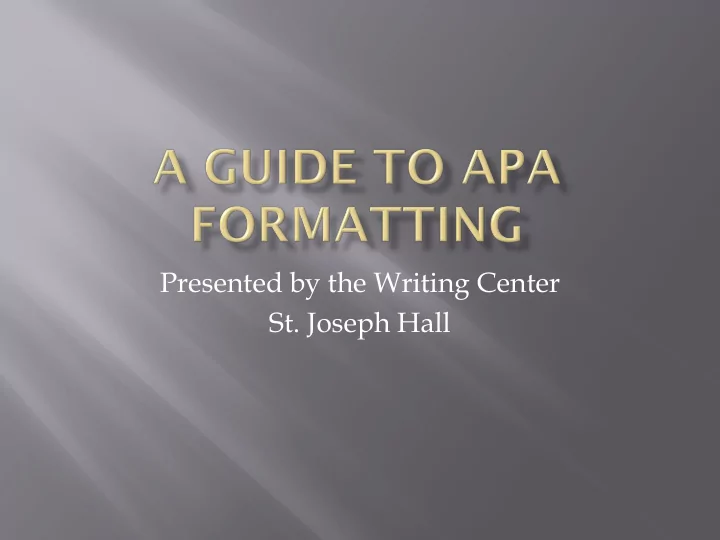

Presented by the Writing Center St. Joseph Hall
APA style is used by many professional groups Education, Psychology, Communications, etc Adds credibility to your work Helps you eliminate errors and plagiarism
8.5” x 11” paper 1” margins on all sides Times New Roman 12 pt font Double spaced
Title Page Abstract Content References Appendices Footnotes/Endnotes
POSITIVISM AND CONSTRUCTIVISM 1 Positivism and Constructivism in the Science Classroom: A Study of Student Reactions John Smith The College of Saint Rose
APA Headings Levels Level Format Centered, Boldface, Uppercase and 1 Lowercase Heading Your paragraph begins below, indented as usual. Left-aligned, Boldface, Uppercase and Lowercase Heading 2 Your paragraph begins below, indented as usual. Indented, boldface, lowercase heading with a period. Your paragraph begins 3 here, in line with the heading. Indented, boldface, italicized, lowercase heading with a period. Your paragraph 4 begins here, in line with the heading. Indented, italicized, lowercase heading with a period. Your paragraph begins here, 5 in line with the heading.
Clear, concise communication Objective Logical
Quoting Paraphrasing Summarizing Facts, statistics, data from outside texts Referring to an idea in passing Use of a visual from outside texts
References information in the paper that is not your own APA Citations Include Author’s last name Year of publication Page Number (usually)
Method A Today’s students study more than their parents did (Smith, 1998). Method B According to Smith (1998), today’s students study more than their parents did. Quotes and Paraphrases Most educators disagree that “students…” (Smith, 1998, p. 24). According to Smith (1998), “students…” (p. 24).
Must be cited Citation requires page number Always ICE your quotes Introduce Cite Explain
Fewer than 40 words Marked by quotation marks “ ” Page number in citation Introduced and explained End punctuation comes after the citation “Students need to be told that plagiarism is a combination of stealing (another’s words or ideas) and lying (implicitly claiming that the stolen material is the student’s own)” in order to prevent academic misconduct (Harris, 2001, p. 30). However, stress can make plagiarism seem like the only answer to completing their work in an efficient manner, regardless of the moral and legal risks.
Longer than 40 words Printed in their own block, all tabbed in Double spaced No quotation marks Introduced and explained Punctuation comes before the citation
Summaries are short, paraphrases are longer Citation includes author’s name and year Summaries do not include page number Paraphrases can, but do not have to Paraphrases do not just change wording, they change structure as well
Original Text It is not surprising, therefore, that sociable people are significantly more likely than nonsociable people to watch reality television, although the differences are small (Reiss & Wiltz, 2004, p. 374). Incorrect Paraphrase It is not shocking that outgoing individuals are much more probable than introverted individuals to view reality television, but the gap is not that significant (Reiss & Wiltz, 2004). Correct Paraphrase Reality television has been found to be viewed slightly more often by outgoing individuals than by those who are introverted (Reiss & Wiltz, 2004, p. 374).
List of every source used in the paper Used for fact-checking and cross referencing
POSITIVISM AND CONSTRUCTIVISM 11 References Bertram Gallant, T. & Drinan, P. (2006). Organizational theory and student cheating: Explanation, responses, and strategies. The Journal of Higher Education , 77 (5), 839-860. Brophy, J. (2006). Graham Nuthall and social constructivist teaching: Research-based cautions and qualifications. Teaching & Teacher Education: An International Journal of Research and Studies, 22 (5), 529-537. Fosnot, C. T. (1996). Constructivism: Theory, perspectives, and practice. New York: Teachers College Press. Hinchey, P. (1998). Finding freedom in the classroom: A practical introduction to critical theory . New York: Peter Lang Publishing. Hinchey, P. (2004). Becoming a critical educator: Defining a classroom identity, designing a critical pedagogy. New York: Peter Lang Publishing.
Article in an internet periodical or database Author, A., & Author, B. (Date of publication). Title of article. Title of Periodical, volume number (issue number), pages. doi: number OR URL of journal homepage OR database name Example Park, C. (2003). In other (people’s) words: Plagiarism by university students—literature and lessons. Assessment and Evaluation in Higher Education, 28 (5), 471-488. Retrieved from http://www.tandf.co.uk/journals/titles/02602938.asp
Book Author, A. (Year of publication). Title of work: Capital letter for subtitle. Location: Publisher. Example Alexander, R., & Lombardi, J. (1998). Joining a community of readers: A thematic approach to reading. New York, NY: Longman.
The St. Rose Writing Center www.strose.edu/writingcenter APA formatting and style guide. (2009). In The Online Writing Lab at Purdue University. Retrieved from https://owl.english.purdue.edu/owl/resource/560/0 1/ The Neil Hellman Library Reference Desk: 454-5181 The Publication Manual of the American Psychological Association , 6th edition. Prentice Hall Reference Guide , 7th edition. Edited by Muriel Harris. www.APAstyle.org
Publication Manual of the American Psychological Association (6 th ed.). (2010). Washington DC: American Psychological Association. APA formatting and style guide. (2009). In The Online Writing Lab at Purdue University. Retrieved from http://owl.english.purdue.edu/owl/resource/560/ 01/ Harris, R. (2001). The plagiarism handbook. Los Angeles: Pyrczak. Reiss, S. & Wiltz, J. (2004). Why people watch reality TV. Media Psychology , 6, 363-378. Retrieved August 1, 2006 from Academic Search Premier.
Recommend
More recommend